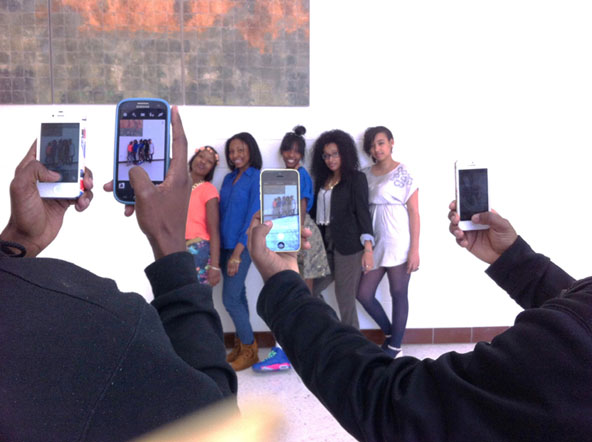Barbara A. Sasso
On any given day outside my classroom, students gather with their illicit mobile phones and take endlessly posed selfies and endless photos of one another. I wonder how many times they will actually look at these thousands of pictures. I wonder if they would learn more by looking at their friends instead of their screens, or their own images in the eyes of their friends.

1
I worry that overuse of these devices is harming their sense of self, their interpersonal relationships, their sense of reality, their ability to focus, and of course in the classroom, their ability to learn. And as a high school English teacher, I wonder how this highly
visual
medium is affecting their ability to read, to understand, and to be profoundly inspired by complex text. I particularly wonder why schools aren't making better educational use of the computers that most students seem to have in their pockets.
Throughout human history each new communication innovation came with dire warnings and predictions of the end of humanity as we know it. The development of a written language is criticized in Plato's
Phaedrus
by an Egyptian king who declares that it will not only produce forgetfulness, for no one will need to memorize anything, but will also produce only "a semblance" of "wisdom" and not "truth" or "real judgment" since the written word comes without need for a teacher's instruction.
2
These warnings were often prescient, but they also underestimated the advantages new communications technology brought: The advent of written language secured power and longevity for civilizations throughout the world, evident in Greece, China, and Egypt. The arrival of paper, the printing press, the telegraph, photography, typewriters, radio, the telephone, television – even the pencil with an eraser – all had their grim critics, all spelling terrible loss for humankind in our ability to remember, to have insights, to think innovatively and passionately.
3
With the advent of satellite communications, home computers, and now computers everywhere we go – the dire warnings continue. What hope have we to survive? Certainly communications technologies have changed us, and over the long course of history one would have to agree that the benefits of the changes have vastly outweighed the drawbacks. But when our students have their eyes glued to screens all day, and new research is examining its detrimental effects on brain functions, our ability to focus, our human relationships, and our perceptions of ourselves and the world, shouldn't educators do more than effetely intone, "Please put away your phone"?
It is time public schools take stock of things and for us to put down our Luddite banners. In public schools everywhere, budgetary concerns challenge our ability to keep up with computer breakdowns and new technological innovations. In addition, in urban schools such as where I teach, many students do not have good access to a computer at home. Yet in my school, almost all of them have a smart phone in their pockets. Students are already using their smart devices in ways that mark them as natives in the technology world and in
useful
ways that might surprise many teachers. My students use their cell phones to take notes and share notes, to research and type papers, to check their grades and homework assignments online, to post their thoughts on teacher-created blogs discussing academic topics, to download books they don't want to carry around, and to keep in touch with their teachers when they have concerns. It is time to welcome these powerful devices into our classrooms and use them in beneficial ways. We might as well. Our students have already done so.
The 21
st
century will surely be noted as a turning point in human history. Those who are natives to it are not aware of the paradigm shift that has taken place in everyday life. We cannot be effective educators if we do not help our students navigate the brave new world inside their screens in positive and constructive ways. Importantly, we also need to teach the value of stepping outside, connecting with our lovely world, and looking at each other without a camera. What are some of the dangers of being drawn into this promised land of virtual reality? Do we already measure ourselves by how many likes or Twitter followings we have?
4
Has the phone screen become a barrier between us and our humanity, a substitute for experience, and a fatuous promise of intimacy, reality and immortality? It is critical that we ask not only how
learning
is affected by Internet use, but as educators of the whole child, we also need to ask how our students'
lives
are impacted by Internet use. And in the classroom, instead of pretending that we don't see the cell phones, teachers need to find ways to guide students to use these valuable devices mindfully – towards more effective learning and more effective
being
.
To that end, this unit proposes to take students back in time by incorporating storytelling and discourse, experiential learning and writing. And it proposes to take them forward in time by utilizing Internet sites familiar to high school students in lesson plans. The goal is to use visual imagery, accessible through smart phones, to support complex text reading and analysis and to inspire students to write emotively about some of the photographs they take. The unit also proposes that research skills can easily be taught and reinforced through students' use of their cell phones in the classroom.